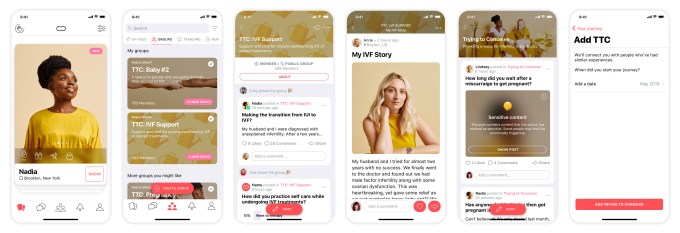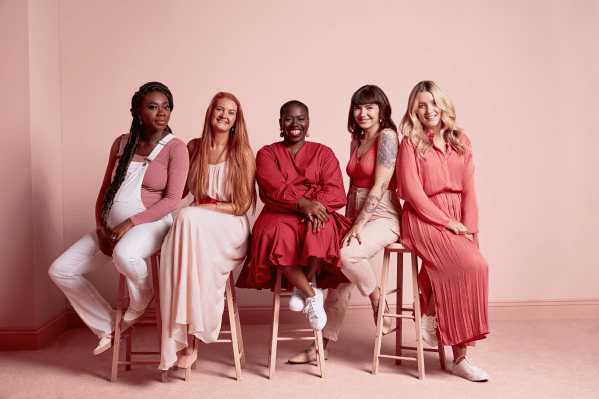Peanut, an app that began its life as a match-maker for finding new mom friends but has since evolved into a social network of more than a million women, announced today it has closed on $5 million in new funding and is expanding its focus to reach women who are trying to conceive. The round was led by San Francisco and London-based VC firm Index Ventures, also backers of Dropbox, Facebook and Glossier, among others.
Other Peanut investors include Sweet Capital, Greycroft, Aston Kutcher’s Sound Ventures, Female Founders Fund, Felix Capital and Partech. To date, Peanut has raised $9.8 million.
The idea for Peanut arose from co-founder Michelle Kennedy’s personal understanding of how difficult it was to forge female friendships after motherhood. As the former deputy CEO at dating app Badoo and an inaugural board member at Bumble, she initially saw the potential for Peanut as a friendship-focused matching app with swipe mechanisms similar to popular dating apps.
Over the past couple of years, however, Kennedy realized that what women needed was more of a community space. The team then built out the app’s features accordingly, with the launch of its Q&A forums, Peanut Pages, last year, and more recently, with Peanut Groups. The latter has now become Peanut’s main use case, with 60% of users taking advantage of the app’s community features and just 40% using the friend-finding functions.

“Community is definitely becoming a very important part of what we do. It’s where we see the users that we deem to be power users — women who are using Peanut for hours every day — they’re very much within the community section,” explains Kennedy. “We see that growth there and it actually guides the product. So we’re taking the behaviors that we see and letting that inform our roadmap,” Kennedy says.
Since around November 2018, Peanut has been growing by 20% month-over-month, as more women discover Peanut’s private and ad-free alternative to Facebook Groups. On Peanut, users are verified (by selfies!), and people have the sorts of discussions that don’t really take place in other social apps.
Even Kennedy admits she was surprised at first by what women were talking about in the app.
“The conversations were much, much more personal and intimate and more related to their lives. So whether that had to do with their sex life or relationships, it was on a deeper level,” she says. “These are conversations that women simply can’t have anywhere else. Of course, they’re not happening in Facebook Groups…these are very intimate and self-reflective moments. And [women] want to do that in a private setting in a private social network,” Kennedy adds.

The new funding, in part, will be used to grow Peanut’s 16-person team to 22 this year, which will then double next year.
In addition, Peanut is expanding access to women who are trying to conceive, with the launch of the Trying To Conceive (TTC) community. This will offer a separate sign-up experience and access to a dedicated network of women, where members can candidly discuss the topic and ask questions. Within TTC, members can also create their own groups — like one for women on their fifth round of IVF, for example — to have conversations with others who are at the same place in their journey.
The community, today, won’t point women to other fertility-focused apps or related health services, Kennedy says, though she sees the potential for strategic partnerships further down the road. In the near-term, however, Peanut plans to generate revenue by way of the freemium model and micropayments.
“We’re incredibly excited to partner with Michelle to grow Peanut from the essential platform for mothers it is today, to a social network for women globally. Peanut is a true companion for women, bringing them together when they need each other the most,” says Hannah Seal, principal at Index Ventures, about the firm’s investment. “We’ve been impressed with the response Peanut has received since launch and look forward to supporting the team as it enters into new areas such as fertility, and expands globally.”
“We want to shine a light on an often silent struggle. What has always been Peanut’s point of difference is enabling conversations women feel unable to have on any other platform. Providing a safe, inclusive space for women to discuss fertility is a natural progression for our brand as we continue to support women throughout each life stage. No woman should ever feel lonely, isolated or muted on such an important issue,” Kennedy says.
